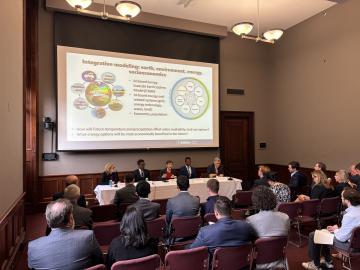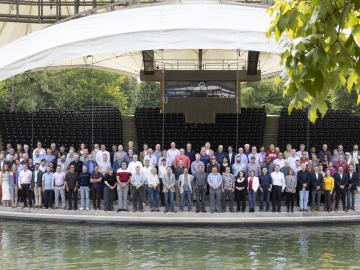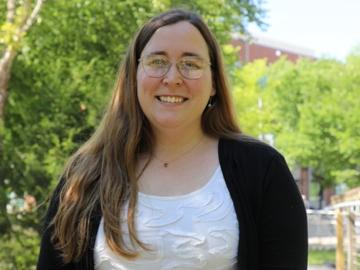
Filter News
Area of Research
News Type
News Topics
- (-) Advanced Reactors (7)
- (-) Artificial Intelligence (35)
- (-) Big Data (25)
- (-) Energy Storage (14)
- (-) Grid (16)
- (-) Nuclear Energy (30)
- 3-D Printing/Advanced Manufacturing (32)
- Bioenergy (17)
- Biology (17)
- Biomedical (24)
- Biotechnology (7)
- Buildings (17)
- Chemical Sciences (17)
- Clean Water (3)
- Composites (7)
- Computer Science (52)
- Coronavirus (13)
- Critical Materials (4)
- Cybersecurity (4)
- Education (2)
- Emergency (2)
- Environment (28)
- Exascale Computing (26)
- Fossil Energy (3)
- Frontier (20)
- Fusion (18)
- High-Performance Computing (35)
- Hydropower (1)
- Isotopes (18)
- ITER (1)
- Machine Learning (17)
- Materials (15)
- Materials Science (31)
- Mathematics (6)
- Mercury (1)
- Microelectronics (1)
- Microscopy (7)
- Molten Salt (1)
- Nanotechnology (5)
- National Security (29)
- Neutron Science (32)
- Partnerships (24)
- Physics (17)
- Polymers (4)
- Quantum Computing (16)
- Quantum Science (26)
- Security (10)
- Simulation (16)
- Space Exploration (5)
- Statistics (2)
- Summit (19)
- Transportation (12)
Media Contacts

The Powerline Conductor Accelerated Testing Facility at ORNL is testing new transmission line technologies to enhance the U.S. power grid's capacity amidst rising demand and climate challenges.

Hempitecture, a graduate of the Innovation Crossroads program, has been awarded $8.4 million by the DOE's Office of Manufacturing and Energy Supply Chains. As part of the grant, Hempitecture will establish a facility in East Tennessee.

Aditya Sundararajan of ORNL’s Grid Systems Architecture group was elevated to senior status within the Institute of Electrical and Electronics Engineers.

A multi-institutional team of researchers led by the King Abdullah University of Science and Technology, or KAUST, Saudi Arabia, has been nominated for the Association for Computing Machinery’s 2024 Gordon Bell Prize for Climate Modelling.

Researchers led by the University of Melbourne, Australia, have been nominated for the Association for Computing Machinery’s 2024 Gordon Bell Prize in supercomputing for conducting a quantum molecular dynamics simulation 1,000 times greater in size and speed than any previous simulation of its kind.

To bridge the gap between experimental facilities and supercomputers, experts from SLAC National Accelerator Laboratory are teaming up with other DOE national laboratories to build a new data streaming pipeline. The pipeline will allow researchers to send their data to the nation’s leading computing centers for analysis in real time even as their experiments are taking place.

Prasanna Balprakash, director of AI programs for ORNL, discussed advancing climate and weather research through high performance computing and artificial intelligence as part of a September 18 panel for the United States Senate.

The Smoky Mountain Computational Sciences and Engineering Conference, or SMC24, entered its third decade with the 21st annual gathering in East Tennessee.

Karly Harrod, recipient of the Early Career Competition Laboratory Directed Research and Development award at ORNL, is focused on extracting disease data from reports. Passionate about global health, she looks forward to applying her expertise to climate data within the geospatial science and human security division.

The Summit supercomputer, once the world’s most powerful, is set to be decommissioned by the end of 2024 to make way for the next-generation supercomputer. Over the summer, crews began dismantling Summit’s Alpine storage system, shredding over 40,000 hard drives with the help of ShredPro Secure, a local East Tennessee business. This partnership not only reduced costs and sped up the process but also established a more efficient and secure method for decommissioning large-scale computing systems in the future.


